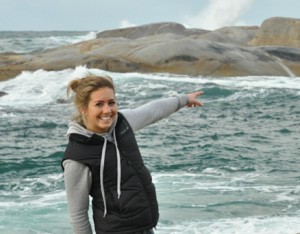
Emma Flukes
More than 80% of the earth is covered in ocean, and yet somehow we know more about other planets than about our very own oceans. People think of warm coral reefs when they imagine what’s beneath the surface, but even though Tassie is cold, we have one of the most amazing marine environments of anywhere in the world.
My whole life has revolved around an obsession with the ocean. I could swim before I could walk. I used to spend so much time in the water that my parents were concerned I’d grow gills. It may still happen one day… So after finishing college, it was no surprise that I enrolled in a Bachelor of Marine Science at UTAS. It wasn’t until my final year of studies that I learned to SCUBA dive, but since then I’ve never looked back.
Soon after graduating in 2008 I began Honours in Zoology, for which I was researching the impacts of the long-spined sea urchin on coastal communities. This species is native to NSW, but climate change has helped it make its way down into Tasmanian waters, where it now feeds on seaweed and forms massive areas of bare, overgrazed rock. This species poses a huge threat to the state’s abalone and rock lobster fisheries, which are worth more than $150 million every year. I was lucky enough to be involved with an exciting team that was investigating ways in which to stop the spread of this urchin by moving large rock lobsters, the urchin’s only natural predator, into key research areas around the Tassie coast. I tracked urchins over time, relocated thousands of big (live!) lobsters, deployed pots to recapture tagged lobsters, and of course did lots and LOTS of diving surveys to monitor the recovery of the kelp beds.
Since finishing Honours, I have continued to work in marine ecology and am currently undertaking a PhD researching the effects of climate change on giant kelps. These are hugely important to the functioning of the whole ecosystem – think of them as the underwater version of the Amazon rainforest. I have been fortunate enough to travel to and dive in some of the most incredible places all over Australia. It’s exciting and rewarding to be working in the area of climate change, which is one of the biggest global threats to the world’s underwater environment. Basically, I get to dive and spend my time in the underwater world that I love, and call it a career. That’s pretty special.
For more information: www.imas.utas.edu.au
